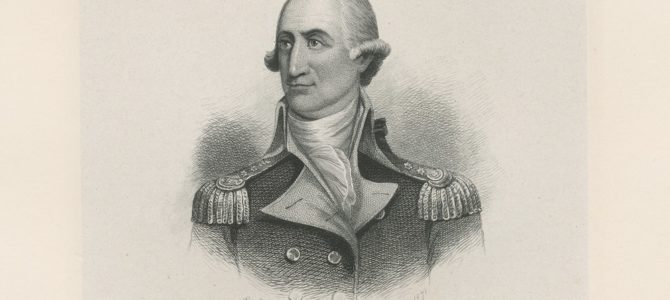
In January 1776, a small church in rural Virginia burst at the seams with parishioners eagerly awaiting the arrival of their pastor. Members of the congregation, who had even spilled out into the cemetery, were alive with excitement.
Over the last few months, with tensions between the colonies and England ever increasing, the members of the Lutheran church had heard from their pastor that a revolution was imminent. He told them the time to take up arms in defense of their nation was now.
This particular Sunday was to be the pastor’s last sermon, and the large gathering represented far more citizens than those who inhabited the small town of Woodstock where the church stood.
Rev. Peter Muhlenberg entered the church dressed in his robe, with a sense of purpose that appeared to make him stand taller than usual. He ascended to the pulpit and delivered his sermon, acutely aware of the importance of what he would say.
As the sermon began its conclusion, Muhlenberg referenced Ecclesiastes chapter three: “In the language of Holy writ, there was a time for all things, a time to preach and time to pray, but those times had passed away.” He faced his congregation for the last time, and in words that he knew meant the end of life in the once- peaceful Virginia countryside, he continued, “There was a time to fight, and that time has now come!”
Muhlenberg removed his robe, revealing his colonel’s uniform, and descended from the pulpit to the sounds of drummers by the church door, drumming for recruits. Three hundred recruits signed that day at the church, and Muhlenberg’s was the first of the Virginia regiments ready for combat service just two months later.
A Circuitous Route to the Pulpit
Muhlenberg had been born to German parents in Pennsylvania in 1746. He was regarded as a precocious young man, with a large, strong build, and an aptitude for hunting and fishing. His father wished for him to follow his path as a clergyman, and sent Peter with his brothers to Germany as a teen to continue his studies.
Peter remained in school for a few years before becoming disinterested. He abruptly joined a British military regiment, where his cunning and spirit earned him the nickname “Devil Pete.” After a brief stint of service in Germany, Muhlenberg was spotted by a British officer who knew the Muhlenberg family from Pennsylvania. Peter had become eager to return to his family in America, and graciously accepted the officer’s request to accompany him back across the Atlantic.
Once Muhlenberg returned to Pennsylvania, he was honorably discharged from the British Army, finished his studies in Philadelphia, then continued to the pulpit. He led Swedish and German congregations in Pennsylvania and New Jersey before being called to Woodstock, Virginia to lead a church.
It wasn’t long after his arrival that the murmurs of a revolution spread through the Shenandoah Valley. Peter, a steadfast Whig since his early years, began closely following the actions and words of Virginians such as Patrick Henry and George Washington. Muhlenberg formed friendships with both of these men, especially with Washington, who was impressed by Muhlenberg’s candor and skill in hunting and fishing.
These relationships not only fortified the pastor’s growing spirit for the cause of independence, but made him famous in his small community of Woodstock. He was looked to as a man of great courage and conviction, and had a unique way of sharing his strengths with those around him.
Americans Select Him to Lead Their Cause
Once England began implementing punitive laws on Massachusetts following the Boston Tea Party, the liberty-minded Virginians would no longer be quiet whisperers of their disdain for their Motherland. Against the laws of the colony, the Committee for Safety was formed in Woodstock, with Muhlenberg named chairman at Washington’s behest.
He spoke openly to the committee about the injustice of taxation without representation, and said the recent acts of the king and Parliament were indistinguishable from tyranny. Such subjects were rarely spoken of in public before this time, for fear of retribution.
Following this meeting, Muhlenberg was elected to the House of Burgesses, and appointed as a delegate to the State Convention in Williamsburg. Much to his dismay, the convention enacted resolutions he considered far too moderate. He agreed with Henry that the time for half measures was over.
Peter was deeply dismayed by the State Convention’s inability to pick up arms against their oppressors. He knew it was only a matter of time before a need for freedom from tyranny became apparent to everyone. In March 1775, the convention gathered again, now in Richmond, with a renewed sense of urgency.
After two days of delegates arguing over the rapidly deteriorating state of affairs in Virginia, Henry put forth his resolutions. He famously declared “Give me liberty, or give me death!” in a speech that eventually moved the convention to agree. The half measures were over. Now was a time to take up arms against the country that had taken away their sense of security and freedom. The royal governor of Virginia declared the proceedings of the convention to be treason. The revolution in Virginia had officially begun.
A Brief Stint Home to Prepare for War
Within only a few months, military conflict began between royalists and colonial militia. Muhlenberg had returned to Woodstock to prepare his community for what was to come. This was truly a time where there could be no turning back. The only path forward was to emerge victorious in a nation free from tyranny. He awaited the direct call to arms, which came in December of 1775.
Muhlenberg was chosen by the House of Delegates as one of six colonels to assemble a regiment. His brief military career in Germany was known only to Henry, but those who knew him knew he was a man of great character and unparalleled conviction. It was the next month that he entered the doors of his church a pastor, and exited them as a military leader.
Muhlenberg was quickly promoted to brigadier general, and called to join Gen. Washington. He led men into many victories, suffered unspeakable hardships with the army, and never stopped believing that what he was doing was anything other than the work of God. His military service was one of honor and distinction, and worth reading much more of.
Following the defeat of the British, Muhlenberg went into politics, where he served in Congress for the Commonwealth of Pennsylvania. He died at age 61 from an illness that had plagued him since an episode of severe exposure during the war.
Muhlenberg was ardently conservative, and a relentless representative of the people. His trustworthiness coupled with relentless pursuit of the moral right made him a lifelong favorite of Washington’s. He spent his life adhered to a belief that this country was meant for unfathomable greatness, and it was God’s will that he be a tool of its creation.
Two hundred and forty-two years after the signing of the Declaration of Independence, it has become too easy to be ignorant of stories like Muhlenberg’s. The idea that great men like him could be forgotten in the fleeting years of time is tragic. People like him knew the evil of tyranny, and were immediately willing to sacrifice their lives to secure liberty—not for themselves, but for us. We live free today because of the courage of men like Muhlenberg.









